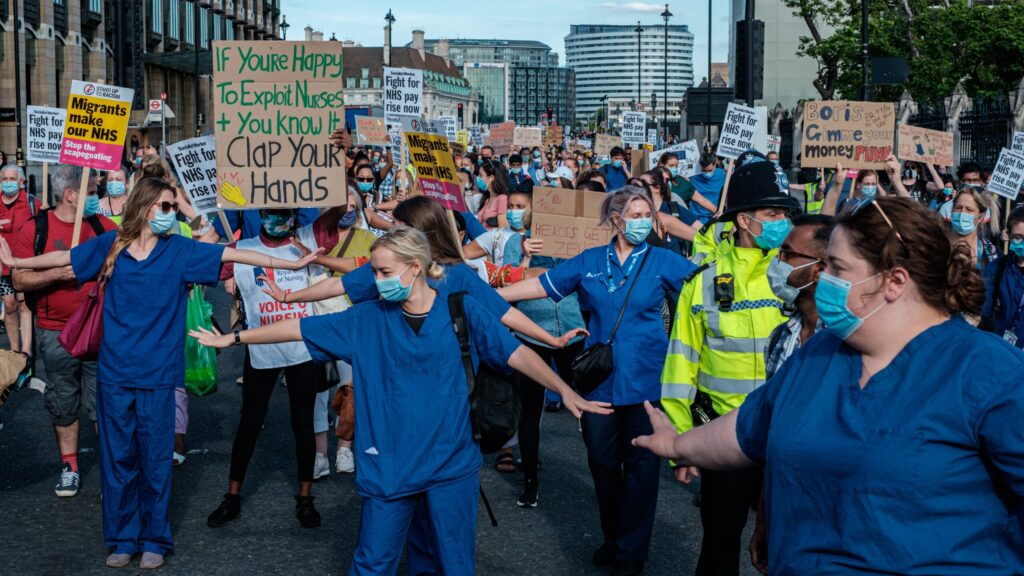Charlotte Dignam
Many NHS strikes have come to a screeching halt as a pay increase offer of 5.2% is put on the table.
The government has put forward a pay hike offer of 5.2% for nurses, midwives, paramedics porters, and cleaners. NHS staff would receive this increase along with a one-off payment worth 6% of their 2022/23 salary.
Before the end of April NHS staff at various trade unions will vote on whether or not to accept this offer.
The impacts of NHS strikes
As the cost of living crisis continues to loom like a dark cloud, striking has become more common, from teachers to civil servants to transport workers, thousands of people have followed NHS workers in taking industrial action to dispute pay concerns and working conditions.
2023 saw the UK’s biggest strike in a decade, with over 500,00 workers taking action in February.
February also marked the biggest round of healthcare strikes since the formation of the NHS.
The NHS staff who spoke with Empoword Journalism wished to remain anonymous because they feared it would impact them, as they are at the early stages of their careers. All felt they would face backlash and be accused of discouraging others from joining the NHS during a staff shortage crisis due to their criticisms of poor working conditions, pay and patient safety.
Kim, a nurse – who has asked us not to use their real name – told Empoword it has become clear striking is their last resort.
They said healthcare staff were “exhausted” and there was “no alternative method for pushing the Government into negotiations.”
“The system is failing and something needs to change”
These strikes saw at least 140,000 appointments cancelled and emergency waiting times increased drastically. Staff reductions also posed challenges for those who were not striking.
Blake, a pharmaceutical student – who has asked us not to use their real name – said: “Being on hospital placement during the strikes was a real eye-opener; I have no idea how they managed.
“Everything was pure chaos. I had a patient come into A&E at 3am who wasn’t seen until midday. Drug charts weren’t filled out until 3pm. The system is failing and something needs to change.”
Responses from Politicians
Prime Minister Rishi Sunak welcomed Health Secretary Steve Barclay’s offer, despite attempts to put forward legislation earlier this year that would restrict workers’ right to strike.
Sunak said: “I need to do what I need to do in order to keep people safe, and to ensure that people can go about their day-to-day lives free of the enormous disruption that these strikes are going to cause.”
Similarly, Barclay said that junior doctors considering industrial action needed to check their conscience.
I have made a formal offer to unions following constructive talks.
It will give staff including nurses, paramedics and physios a fair pay rise while protecting our commitment to halve inflation.
NHS workers do a brilliant job and I urge union members to accept this offer. pic.twitter.com/5h8ay4WeUl
— Steve Barclay (@SteveBarclay) March 16, 2023
The Labour Party has urged the government to put an end to walk-outs through negotiations. Shadow Health Secretary Wes Streeting has criticised the Conservative’s decision-making in the midst of the pay dispute. Streeting also hopes the 5% offer will be accepted.
Given the size of the turnout and the scale of the result, I am astonished that the Health Secretary has not met with the Junior Doctors today.
This Government has learned precisely nothing from its appalling handling of negotiations with NHS staff.
— Wes Streeting MP (@wesstreeting) February 22, 2023
What do the unions say?
Out of all unions involved, only Unite is not recommending the offer to its members, arguing the proposals do not match inflation.
Unite England’s general secretary, Sharon Graham said: “It is clear that this government does not hold the interest of workers or the NHS at heart. Their behaviour and disdain for NHS workers and workers generally is clear from their actions”.
National secretary of GMB Union, Rachel Harrison sang a different tune, regarding the offer as a “significant advance” in their campaign.
Sara Gorton, UNISON’s head of health said: “[The offer] is better than having to wait many more months for the NHS pay review body to make its recommendation.”
The reality
Despite a new offer, healthcare workers say NHS pay has been under the rate of inflation for 13 years, and the realities for many means living paycheck to paycheck.
According to a survey conducted by NHS Charities Together and the Observer, half of NHS Trusts are providing or planning food banks for staff as many plunge into in-work poverty.
As a result, NHS staff are increasingly exploring and pursuing careers in other countries. A radiographer told Empoword Journalism that from Canada to Australia, pay – even starting salaries – is often more than double than in the UK.
The Conservative’s offer also fails to include junior doctors, meaning more walk-outs are planned. The British Medical Association put an advert in The Guardian which stated: “Thanks to the government, you can make more serving coffee than saving patients,” referencing that junior doctors are paid less than Pret a Manger staff.
Full page in @guardian today. Let’s spread the word about #PayRestoration for Junior Doctors #DayTwo #JuniorDoctorsStrike pic.twitter.com/z401JTiJKj
— The BMA (@TheBMA) March 14, 2023
A final-year nursing student said she “should be filled with excitement at the prospects of starting work on the front line,” but is instead experiencing “anxiety and doubt.”
“I’m already looking at ways to enter the private field,” she said.
Beyond pay cuts and 12-hour shifts, a nurse said the mounting debt as a result of tuition fees and hours of unpaid labour through placements makes working for the NHS an “unappealing career”.
The union ballots will soon decide the outcome of this pay dispute.
Photo by Ehimetalor Akhere Unuabona on Unsplash. No changes made to this image. Image license found here.

